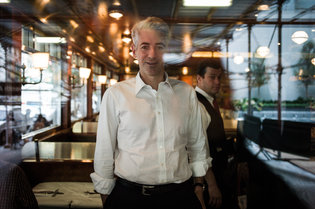William Ackman is a wildly successful hedge fund manager. He oversees $17 billion of mostly other people’s money. Forbes estimates his personal net worth at $1.7 billion. These facts alone would make him a prime candidate to buy the penthouse condominium at One57, the new luxury tower on West 57th Street.
And indeed, Mr. Ackman told The Times in a fascinating profile Sunday that he is the buyer of the 13,500-square-foot condo with an estimated price of $90 million. What is more shocking is what he plans to do with it.
Apparently content living with his family on the Upper West Side, he told The Times he was purchasing one of the most expensive properties in New York because “I thought it would be fun” and he and some close friends “bought into this idea that someday, someone will really want it and they’ll let me know.” They may throw the occasional party there.
Bill Ackman is a condo flipper! It may be the most expensive attempted condo flip in history, but in substance it isn’t much different from the middle-class dreamers who bought a preconstruction condo in Florida in the mid-2000s in hopes of selling it a couple of years later at a great profit.

It may seem like a funny example of the ways the wealthiest one-hundredth of 1 percent live. But it is also, as it happens, an uncommonly clear window into some of the deeper flaws of 21st-century finance.
Why do we have a financial industry? Banks, bond and stock markets, hedge funds and private equity shops play a lot of roles in the economy, but the most fundamental is to channel capital to its highest and most productive use. That’s a really important role, on which economic growth depends. When it is done wrong (as when the financial system funneled billions to money-burning dot-coms in the late 1990s or toward unsupportable mortgage loans in the mid-2000s), the consequences are devastating. When the financial system channels money to companies with good business prospects, making capital available to those with the best ideas, it works for everybody.
There are arms of the financial industry that don’t immediately seem to fit that classification of “people who help steer capital to productive uses” but that do make the whole system work better. For example, in futures markets there are traders whom you might want to write off as speculators, but in fact provide a useful service. They ensure that when an airline needs to insure against rising jet fuel prices, or a manufacturer wants to avoid the risk of being paid in a falling currency, somebody will be willing to take the other side of that trade at a reasonable price.
But at some point you get to parts of the financial industry that aren’t making the economy more efficient. There you find the people exploiting momentary inefficiencies to get richer without making the rest of us any better off. High-frequency trading algorithms are a prime example, with enormous computing power deployed toward exploiting split-second moves that have no meaningful benefit for a company that uses the stock market to raise capital or a long-term investor who wants to buy that stock.

There is a lot of financial activity in which it can be hard to tell whether it’s the good type of financial speculation or the bad. When a private equity outfit takes over a company, is it replacing poor management with better management, or just cutting research and development expense and taking on more debt in hopes of flipping the company without actually doing anything to improve its long-term prospects?
Or, to bring it back to Mr. Ackman, consider the time he waged an attack on Herbalife, the nutritional supplement company, arguing it was a pyramid scheme. Was he exposing potential fraud and making markets more efficient by ensuring that Herbalife’s stock price more accurately reflected its long-term prospects? Or was he using publicity to punish a good company for his own profit?
In those cases, the answer is ambiguous and debatable.
Which brings us back to Mr. Ackman’s apparent plans for the penthouse at One57. What makes it interesting is that unlike a typical private equity deal or hedge fund, it is pretty transparent what is going on here, if one takes his comments to The Times at face value.
The Upshot
In a weekly e-mail newsletter, get the best of The Upshot's analysis about politics, policy and everyday life.
Mr. Ackman seems to view the penthouse as a one-of-a-kind property. It’s “the Mona Lisa of apartments,” as he put it to the Times, that, thanks to its uniqueness, will appeal so much to some other rich person in a few years that he or she will be willing to pay far more than the estimated $90 million Mr. Ackman and his friends are paying now.
Even if he’s right — and the combination of other super-luxe condo towers now under construction, increasingly hostile relations between the United States and billionaire-rich Russia, and falling oil prices that will hurt the income of Middle Eastern plutocrats all work against him — it’s a fascinating study in financial speculation that isn’t creating any value for society.
The finance guys who provided the construction loan that funded the building of One57 helped create value. So did the architects who designed it, the construction workers who built it and the developers who brought all these pieces together to turn a raw piece of land into a 90-story tower with a hotel and housing that people can make good use of.
You could ask what’s the difference between letting it sit and then flipping it and living there and then selling it. It’s a bit like a division of Goldman Sachs that warehoused a huge chunk of global aluminum supplies, as The Times reported last year. Goldman didn’t mine the bauxite or smelt the aluminum. According to that report, it moved aluminum from warehouse to warehouse to make money, during which time the aluminum wasn’t available to be used productively in drink cans or airplane parts.
Mr. Ackman is making a bet that the high-end real estate market in New York, for whatever reason, currently misprices the penthouse, and that in a few years this mispricing will be corrected. In the meantime, a 13,500-square-foot apartment with magnificent views of Central Park and, on a clear day, the entirety of New York, will sit empty the great majority of the time waiting for that day.
It’s actually destroying value: There’s the opportunity cost of whatever the apartment would rent for, plus the maintenance fees and property tax his investment group will have to pay on the empty condo used for the occasional party.
Mr. Ackman’s deluxe apartment in the sky may not be his biggest deal this year, or the one most important to his long-term wealth and reputation. But it is the clearest example you can find of a financier doing a deal that does nothing to make the economy better off.